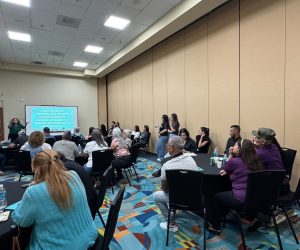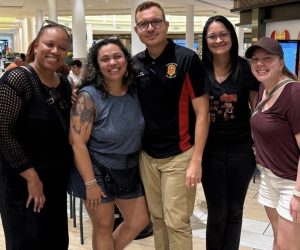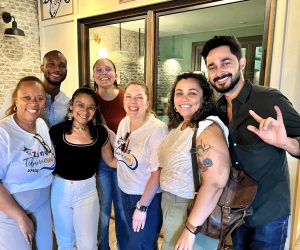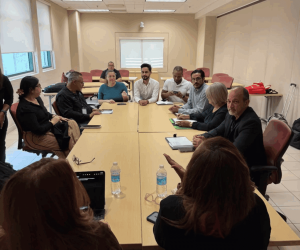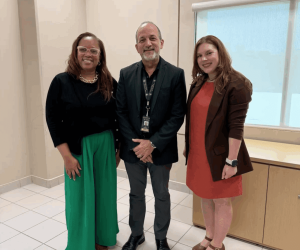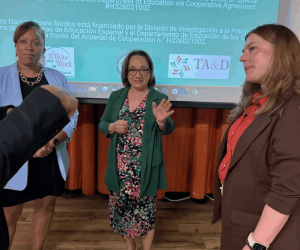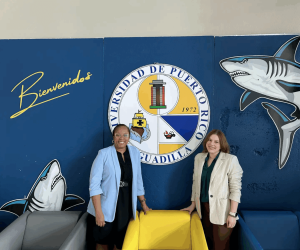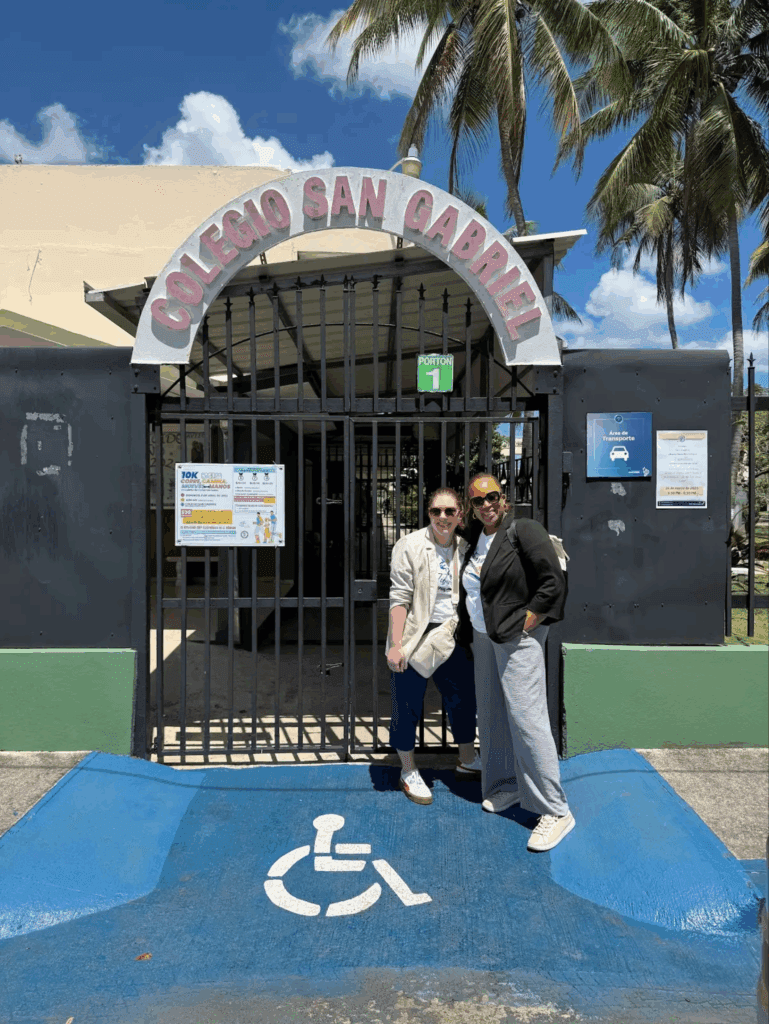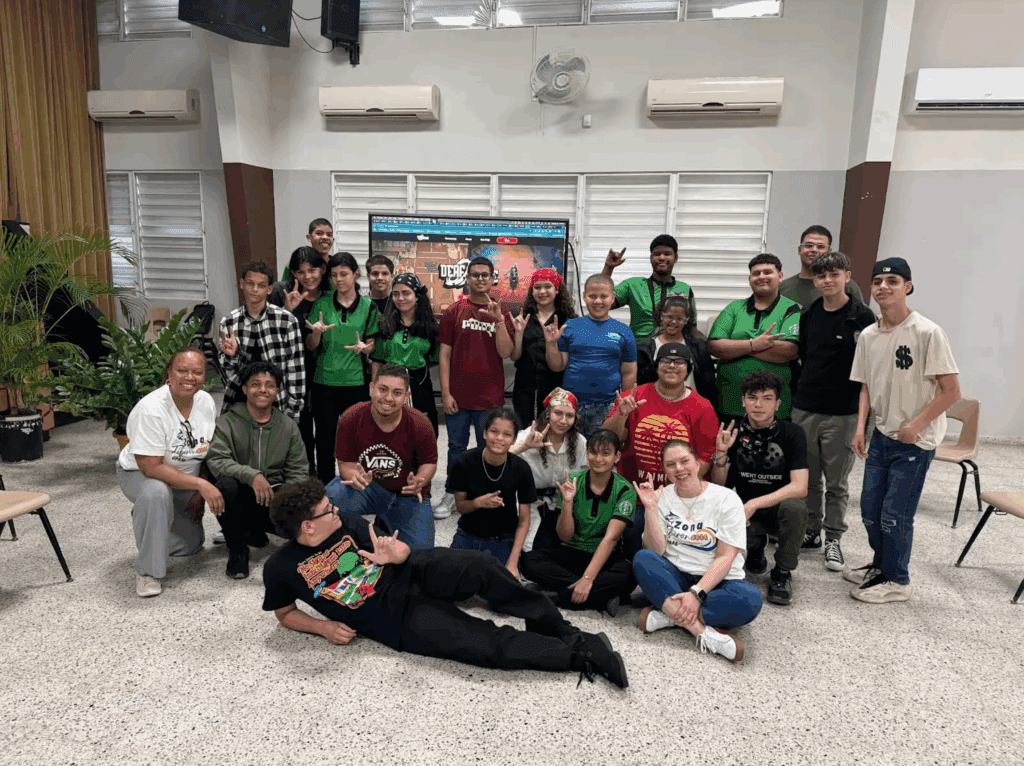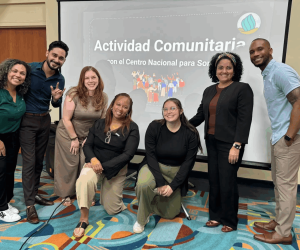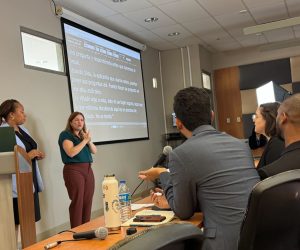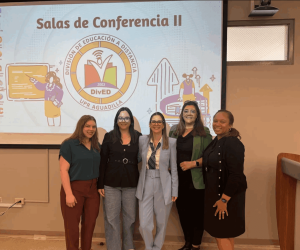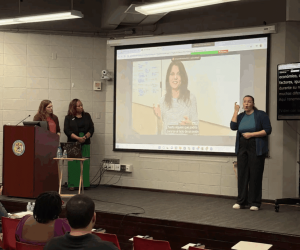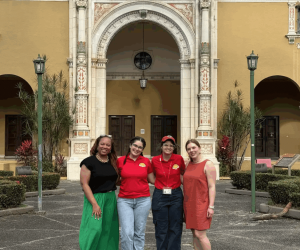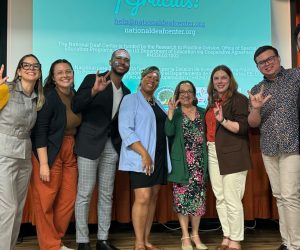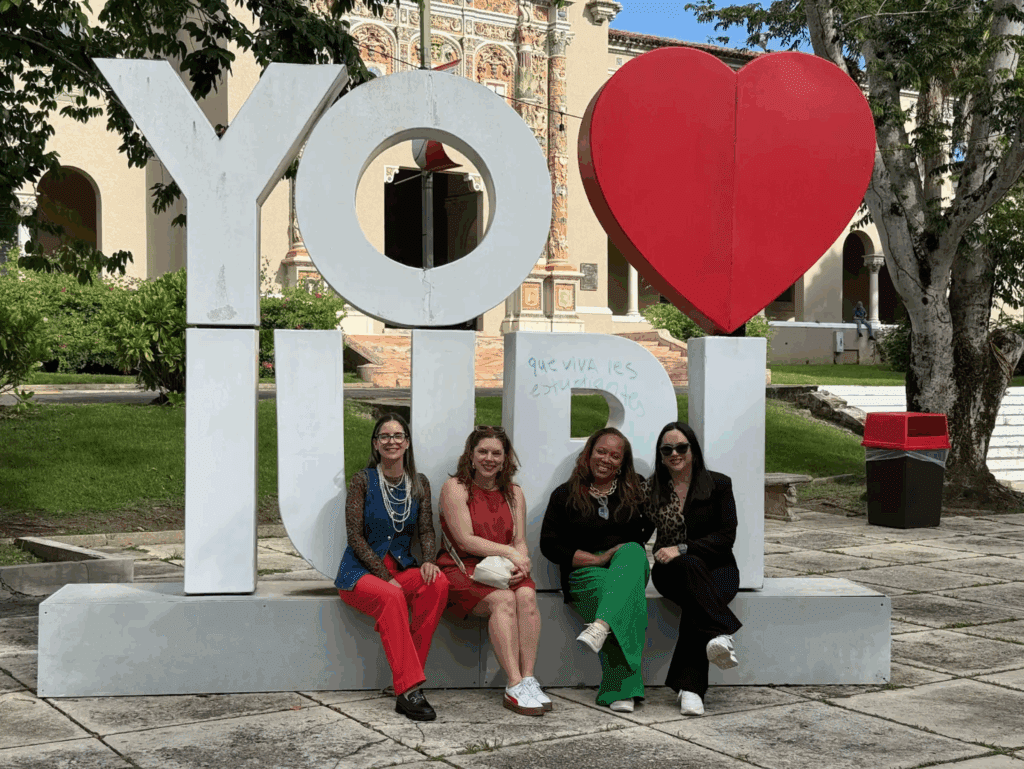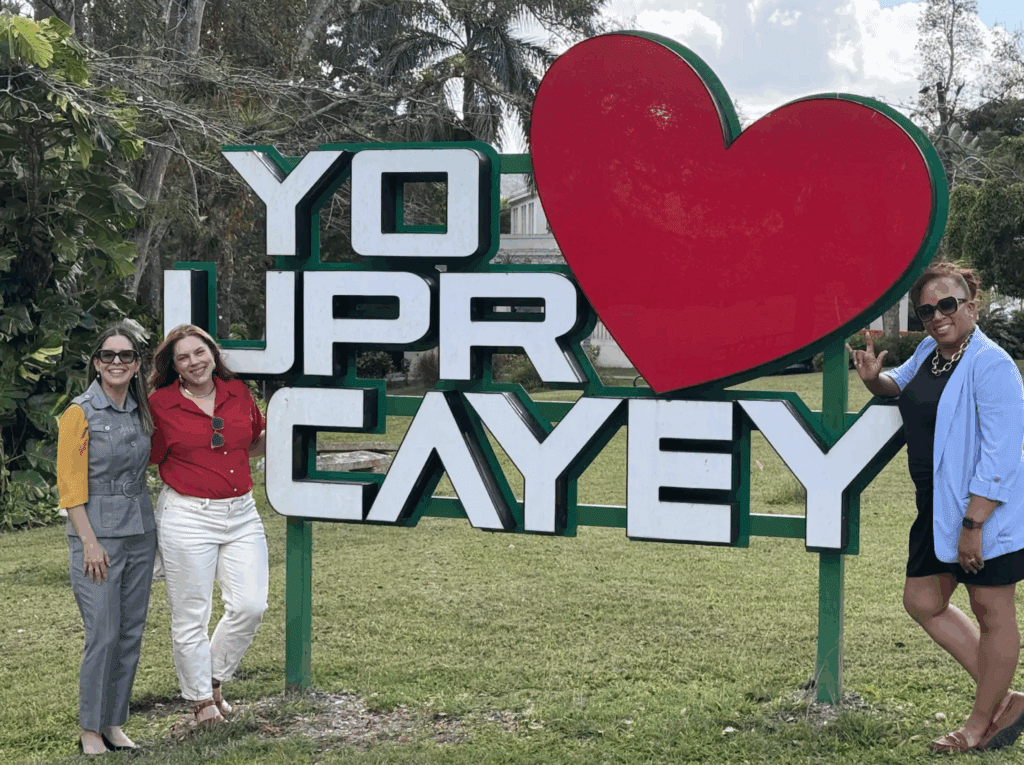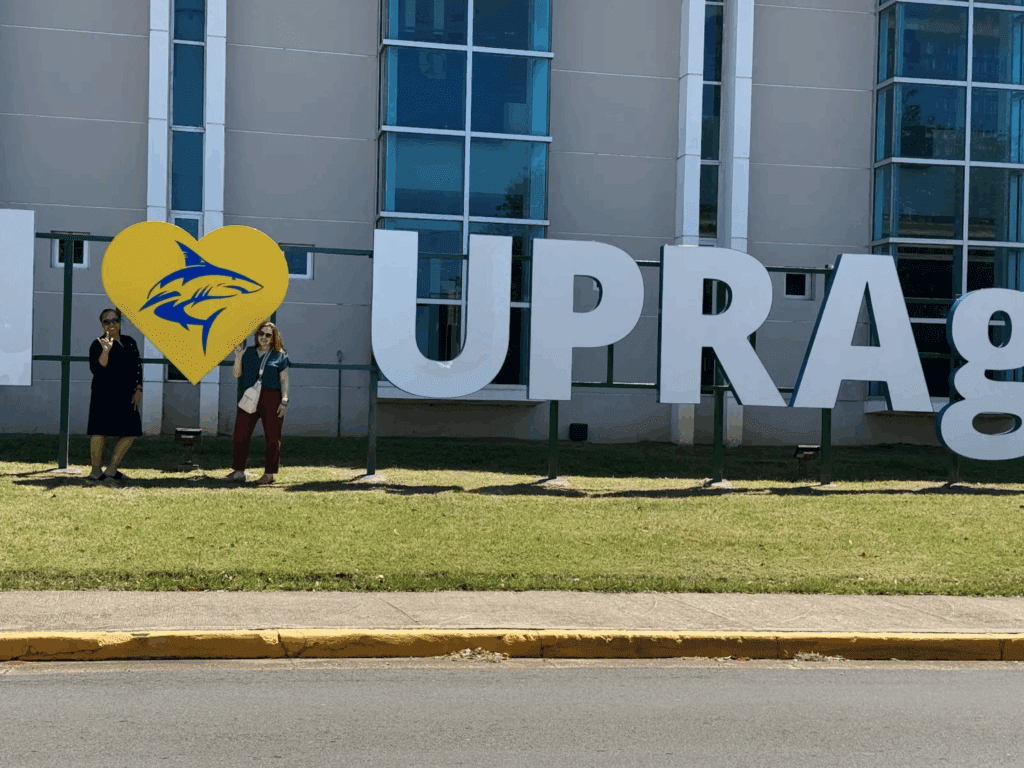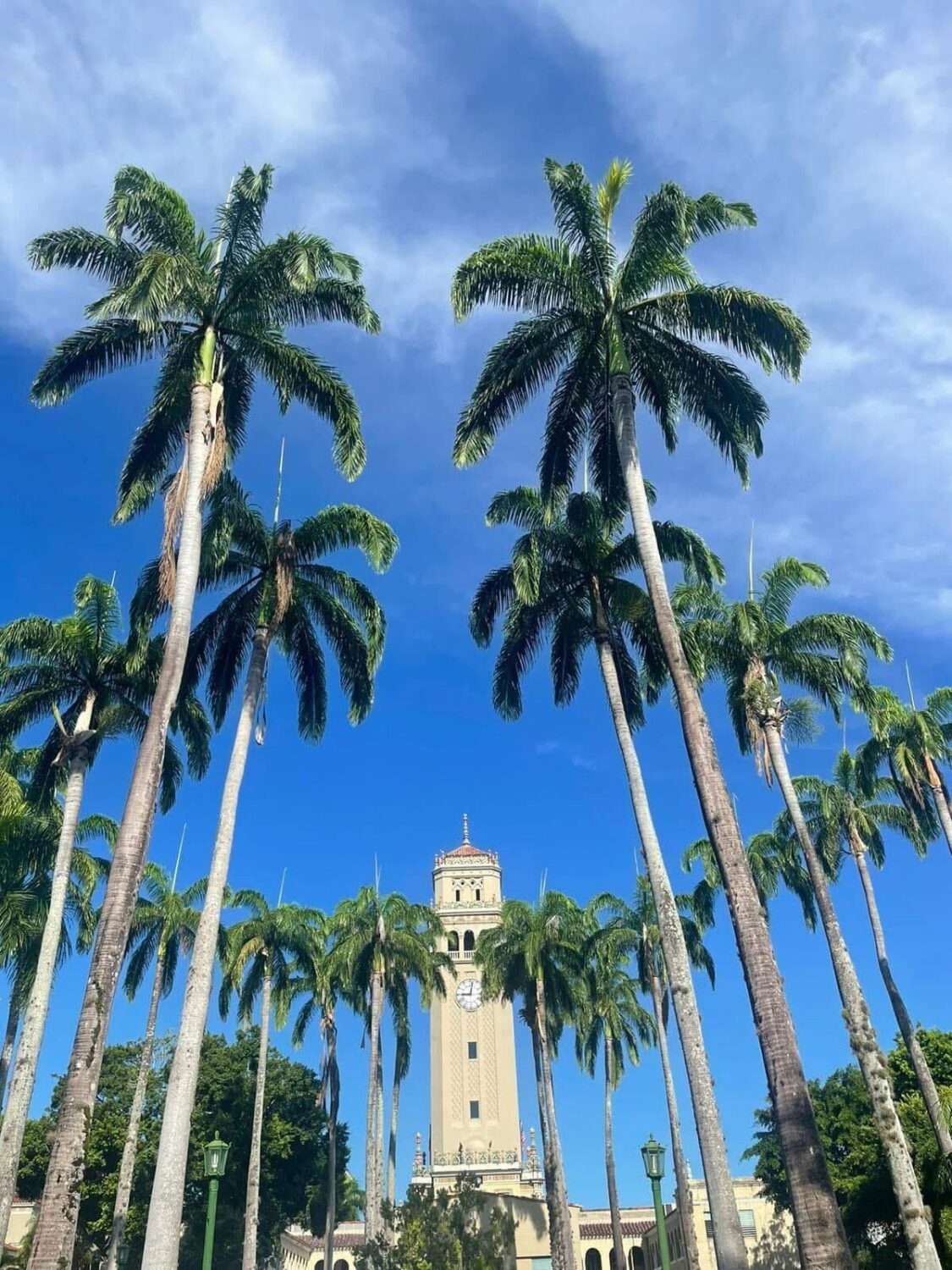In partnership with the University of Puerto Rico campuses in Aguadilla, Río Piedras, and Cayey, our team traveled to the heart of Borinquen. The university campus staff invited NDC because they saw a need and wanted to do better for their students.
What began as a mission to collaborate with campus staff, students, and community members on improving accessibility and outcomes for deaf people in postsecondary education quickly unfolded into something far richer. Exchanges of stories, insights, and shared commitment to uplifting deaf people revealed the unwavering community spirit rooted in resilience and the Boricua spirit.
Strength in Community and Commitment
The incredible strength and advocacy within the community stood out most throughout the visit. Communities are doing everything they can to get the support they need—often with few resources. Many shared stories of persistence, hard work, determination, and tireless advocacy. Parents described navigating complex systems to secure services for deaf children, and educators went above and beyond to provide individualized support.
In San Juan, the local Starbucks became more than just a coffee shop—it transformed into a vibrant gathering space that echoed the feel of an old-school deaf club. With a commitment to keep doors open later than regular business hours, Starbucks offered a welcoming place for connection, storytelling, and laughter. True to the Puerto Rican spirit of ‘comunidad de corazon’ (community from the heart), NDC staff were unexpectedly invited to participate in celebrating the birthday of a beloved community member. Moments like that can’t be planned or replicated—they reflect the deep sense of belonging and genuine care that runs through the heart of Puerto Rican culture.
These local efforts, combined with motivated campus initiatives, such as the University of Puerto Rico as a solid foundation to increase opportunities for postsecondary education and training. Several University of Puerto Rico campuses have committed to actively leveraging initiatives to ensure campuses are more welcoming for deaf students and the deaf community, showing a clear commitment to improvement.
“In our work, we have found that the likelihood of successful and sustainable outcomes happens when there is a system-wide investment. The participation of administration and staff, from all different departments, was powerful. They demonstrated a commitment to learning and asking questions so they can do better for deaf people,” said Tia Ivanko, NDC Co-director.
Persistent Barriers and Challenges
Conversations highlighted areas where additional support is needed. Concerns shared align with NDC’s research on root-cause barriers, including limited access to language and communication, low expectations, and a lack of qualified and experienced professionals serving deaf people. A critical shortage of interpreters has limited accessibility and opportunities for deaf people. These factors directly impact the quality of services and range of opportunities for deaf people in Puerto Rico.
During our community conversations, many deaf people shared gratitude for family and community networks and frustration with navigating systems that are not responsive to their requests. Students and families expressed dissatisfaction with the lack of transparency of policies and procedures across agencies and the limitations imposed by low expectations. These reflections point to opportunities for growth through targeted professional development and a continued commitment to building more responsive, deaf-centered services.
Opportunities for Alignment and Growth
Despite these challenges, the visit revealed numerous opportunities for collaboration and potential for meaningful change. People are open to working together, there is a strong interest in cross-agency partnerships—from K–12 schools to higher education to vocational services—which offers a path forward.
Kate Lewandowski, NDC’s Strategic Support Coordinator, shared that one of her favorite parts of the trip was connecting with the deaf high school students at Colegio San Gabriel. Kate shared that “Seeing their career aspirations and discussing self-advocacy strategies reinforced the importance of continuing to work with the local community committed to supporting deaf students in reaching their goals.”
Expanding professional development, increasing awareness of deaf culture, and documenting success stories can help shift perceptions and build momentum. Starting early—with family support and language access—is an evidence-based strategy to set students up for postsecondary achievement and future employment.
Feedback From The Community
English: “I learned a lot about how to improve access for deaf students in my classroom and on campus.”
English: “This training helped me better understand the barriers deaf individuals face and how I can be part of the solution.”
English: “I had never considered how administrative processes affect deaf students. Now I am more aware and equipped.”
English: “I thought it was excellent. It helped us see the importance of inclusion across all departments, not just academics.”
What We Learned
This trip marks the start of something much greater. It was as much a learning experience for us as it was an opportunity to share. Despite ongoing challenges, Puerto Rico is rich with leadership and community-driven activism. Concerted efforts for collaboration can challenge static systems.
Here are some key insights our team gained from collaborating with our community partners in Puerto Rico:
- Local advocacy is thriving. All over the island, families, educators, and community leaders are committed to building program support for deaf youth, starting with early intervention initiatives and establishing deaf-led agencies focused on strengthening opportunities for community members. Their dedication is a catalyst for progress.
- College is a viable option! Institutions like the University of Puerto Rico are committed to supporting deaf students and generating momentum to strengthen accessibility and campus life. During training at UPR Aguadilla, Río Piedras, and Cayey, UPR staff from multiple departments, from facilities management to central administration, identified tangible action steps to improve campus access.
- Community stories are rich with success and valuable learning lessons. Deaf people are overcoming obstacles and thriving in educational and professional settings—for example, a deaf student graduating with a master’s degree in music therapy, deaf teachers supporting parents with language development, and a deaf interpreter hired to provide access for a deaf student in a mainstream setting.
What's Next?
The goal is clear: aligning efforts across systems so that deaf students in Puerto Rico have access to postsecondary education and career pathways. Rooted in the spirit of “¡Yo soy Boricua, pa’ que tú lo sepas!,” deaf community members, community allies, and professionals carry a deep sense of pride, resilience, and responsibility. This requires sustained partnerships and investment and a shared commitment to high expectations and accessibility practices.
The goal is clear: aligning efforts across systems so that deaf students in Puerto Rico have access to postsecondary education and career pathways. Rooted in the spirit of “¡Yo soy Boricua, pa’ que tú lo sepas!,” deaf community members, community allies, and professionals carry a deep sense of pride, resilience, and responsibility.
This requires sustained partnerships and investment and a shared commitment to high expectations and accessibility practices. By working together and honoring the community’s strengths, they are committed to creating experiences that reflect Puerto Rico’s values of unity, respect, and perseverance. We’re thankful to everyone who shared their experiences and ideas with us, and we look forward to building on this momentum together. We’re excited to keep the conversations going, as well.
Whether you met us at a training, joined a community event, or just want to learn more, we’re here for it. Wondering how you can stay connected with us? If you’re interested in bringing NDC to your campus, have feedback, or want to share your story, email us at help@nationaldeafcenter.org.
Gracias, Puerto Rico. We’ll see you again soon!


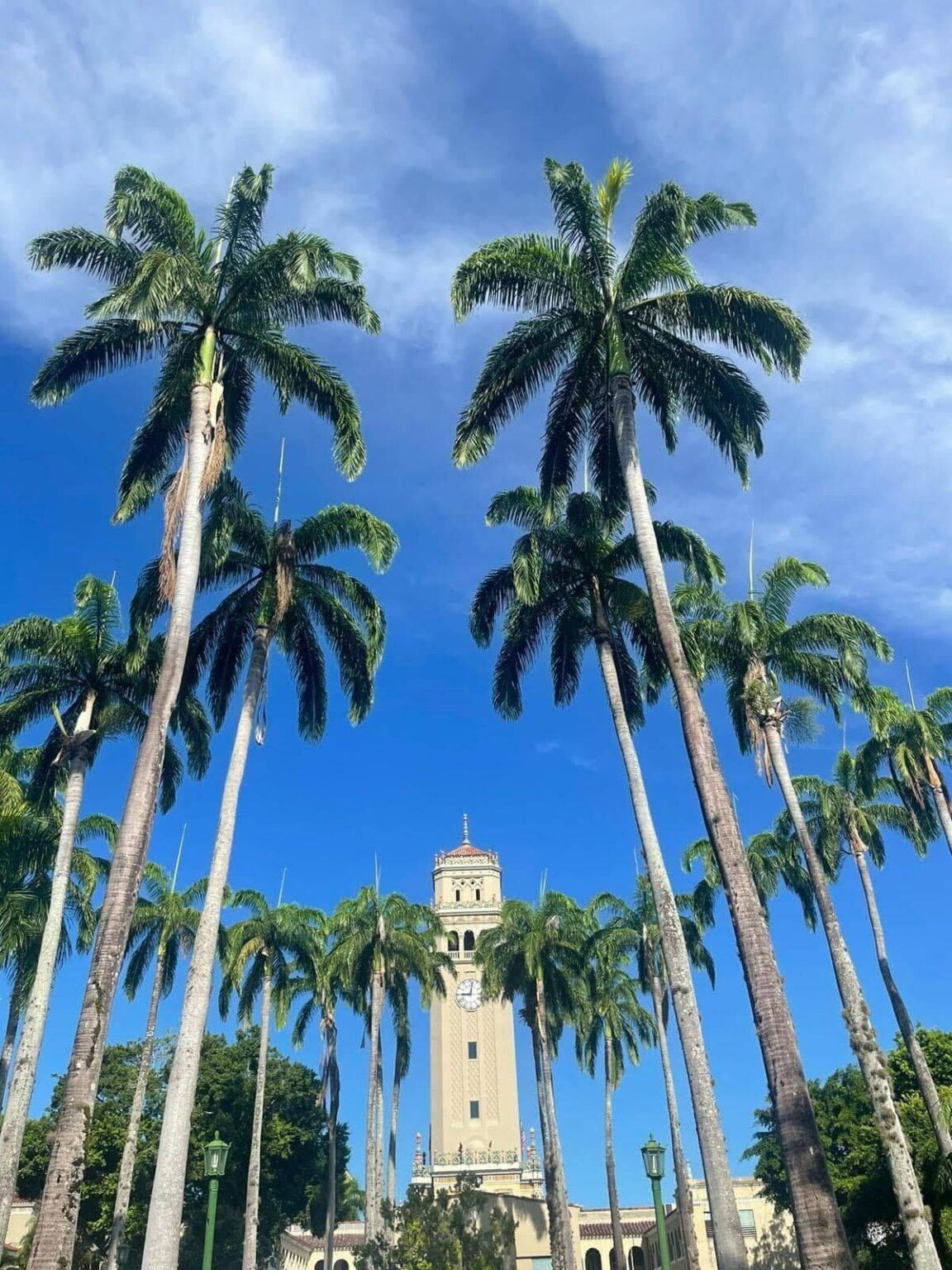

![Kate and Tia standing at a large sign that reads "I [heart] PR" and holding up "ILY" signs in ASL.](https://nationaldeafcenter.org/wp-content/uploads/2025/05/ILPR-836x1024.png)
![Tia & Kate at the "¡Boricua!" sign in Old San Juan, Puerto Rico, features large, colorful letters spelling out "Boricua"—a term of cultural pride rooted in the island's Taíno heritage. Set against the backdrop of San Juan's historic architecture, the sign serves as a popular photo spot and a vibrant celebration of Puerto Rican identity.([Yelp][1]) [1]: https://www.yelp.com/biz/sign-boricua-san-juan?utm_source=chatgpt.com "SIGN ¡BORICUA! - Updated December 2024 - FV7P+89, San Juan, Puerto Rico - Landmarks & Historical Buildings - Yelp"](https://nationaldeafcenter.org/wp-content/uploads/2025/05/IMG_4609-1024x627.jpg)
